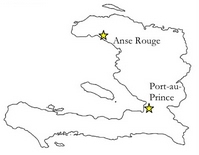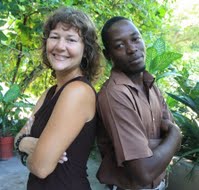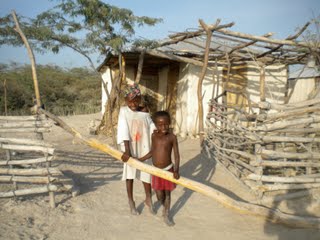Nearly 300 dead, 3,600 sickened. The cholera epidemic has not yet peaked, and is now “settling” in Haiti, becoming yet another endemic disease — an endemic originating in the provinces, not Port-au-Prince.
“This is nothing new. Before the earthquake, it was the same deal,” said Asheville’s Amber Munger, founder of the Article 29 Organization that works with Haitian peasantry in Commune Anse Rouge, five hours north of Haiti’s capital. “All of the assistance is going to Port-au-Prince. “
__________________________
Children outside of a typical home in La Source Chaude (which means Hot Springs), the trading village where A29 has its headquarters. Unlike the rest of Haiti, much of Commune Anse Rouge is a desert, complete with cactus forest. Photo courtesy of article29organization.org
__________________________
Hundreds of thousands fled the capital for the provinces after the earthquake. But little demographic research was done on these victims, with all media and aid attention focused on the tent camps in the capital.
For example, the Artibonite region, the source of the outbreak, houses the greatest number of displaced earthquake victims, about 600,000, according to an Oxfam report.
“In the provinces, people have been needing so much for so long, just a little bit will make a difference,” Munger said. “But it’s been really hard to get the attention of the humanitarian organizations.”
Munger has been hospitalized for a severe E. Coli infection, which she contracted working in the Commune Anse Rouge region. Still on an IV, doctors won’t let Amber return to Haiti until the infection has cleared.

Anse Rouge is isolated from Haiti’s major markets, and the only commercial activity that exists in Anse Rouge is agriculture, according to Article 29 Oganization. More than 80 percent of the population of Anse Rouge depends on farming for their survival. Yet, the area suffers from deforestation that has led to desertification and vulnerability to flash flooding.
Though the northwest section of Haiti saw slight improvements by six months after the quake, in Commune Anse Rouge, “nothing has changed,” she said.
“There are still no new partners, and we are not seeing any improvements,” she said.
No change, despite a 30-to-35 percent population increase in this region since the quake. There are approximately 36,000 people living in Anse Rouge, according to Article 29 Organization.
The people in Commune Anse Rouge don’t have access to outside resources, Munger explained.
“There is no such thing as bottled water where we live.”
There are no trees for firewood, and charcoal is expensive. So boiling water would be a huge expense, and isn’t practical for families, Munger said.
A cholera outbreak in this region, she said, “would be devastating.”

__________________________
Amber Lynn Munger, director, and Hebert Pierre, field coordinator.
__________________________
Article 29’s Haitian coordinator, Herbert Pierre, called Munger Saturday in a panic. “He asked if it [cholera] was in the United States, because nobody there knew anything about [its extent inside or outside Haiti],” she said. “I thought it was really ironic that people in La Sous were calling me, in the United States, to ask me what was happening in their own country.”
Munger sent cholera-prevention information in Creole, but in the event of an outbreak, it would be of no use to the sick.
The region has very limited access to public health resources, medical care or even the news.
“If we really want to see change in Haiti, we need to start looking at qualitative-versus-quantitative,” Munger said. “[Quantitative is] the development approach that we’ve had for Haiti for the last 30 years and it hasn’t worked, it’s created the situation we are in now.”
“Now is as good a time for change as any,” she said.
In the undeveloped provinces, the focus must be on prevention. La Sous, in Commune Anse Rouge, Haiti, needs our help. “This cholera epidemic highlights the importance of sanitation,” Munger said. “It’s not something we think much about in the United States, because the government provides this for us, so we don’t have to see it or smell it.”
Residents in La Sous are asking for composting toilets, a sustainable solution to the situations that cause epidemics like cholera.
The toilets would be installed in the public marketplace, where hundreds from around the region gather three times a week to sell their wares. The cost of two composting toilets, engineered by the organization SOIL, is around $2,000.
“We would also like to purchase art materials and hire local artists to make the building beautiful and a source of pride for the community,” she said, which would add about $600 to the cost of the toilets.
Contact Munger at www.article29organization.org for more information on donations and fund-raising efforts.




Before you comment
The comments section is here to provide a platform for civil dialogue on the issues we face together as a local community. Xpress is committed to offering this platform for all voices, but when the tone of the discussion gets nasty or strays off topic, we believe many people choose not to participate. Xpress editors are determined to moderate comments to ensure a constructive interchange is maintained. All comments judged not to be in keeping with the spirit of civil discourse will be removed and repeat violators will be banned. See here for our terms of service. Thank you for being part of this effort to promote respectful discussion.